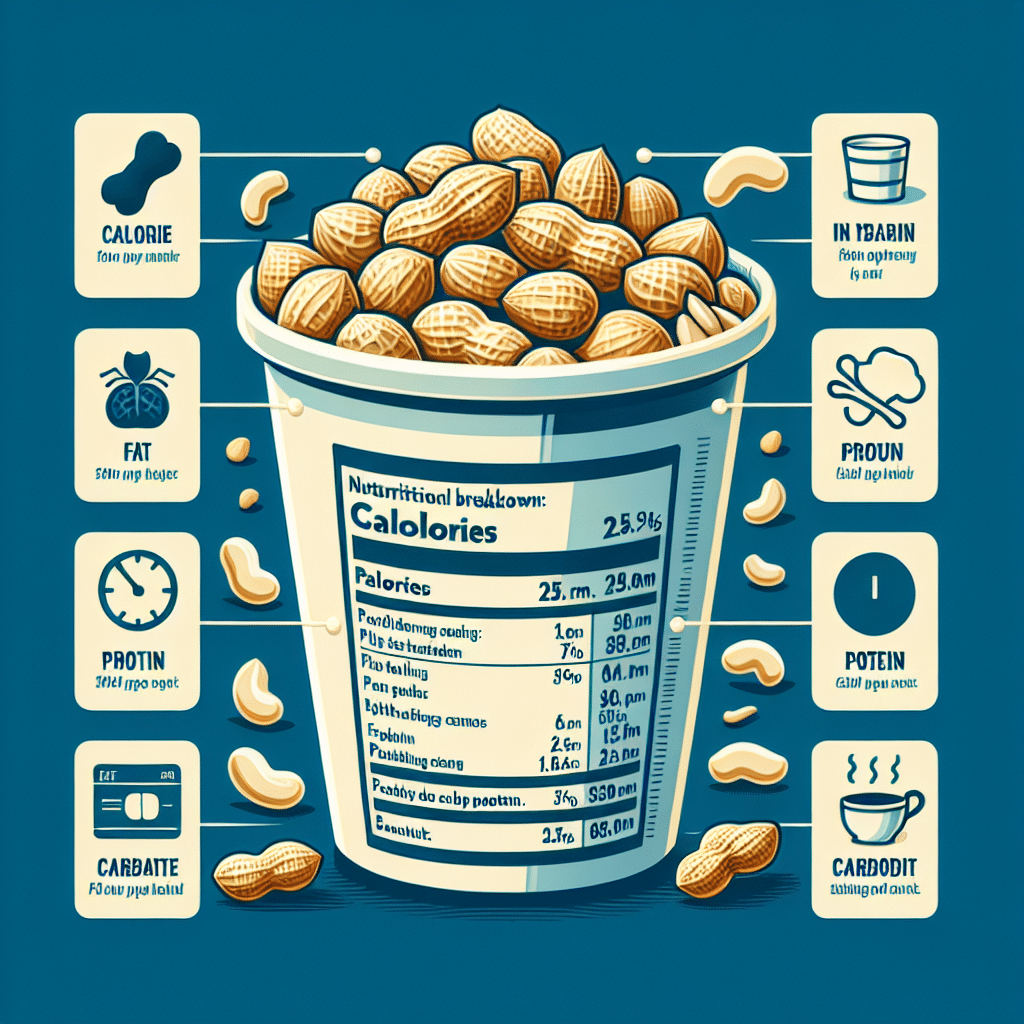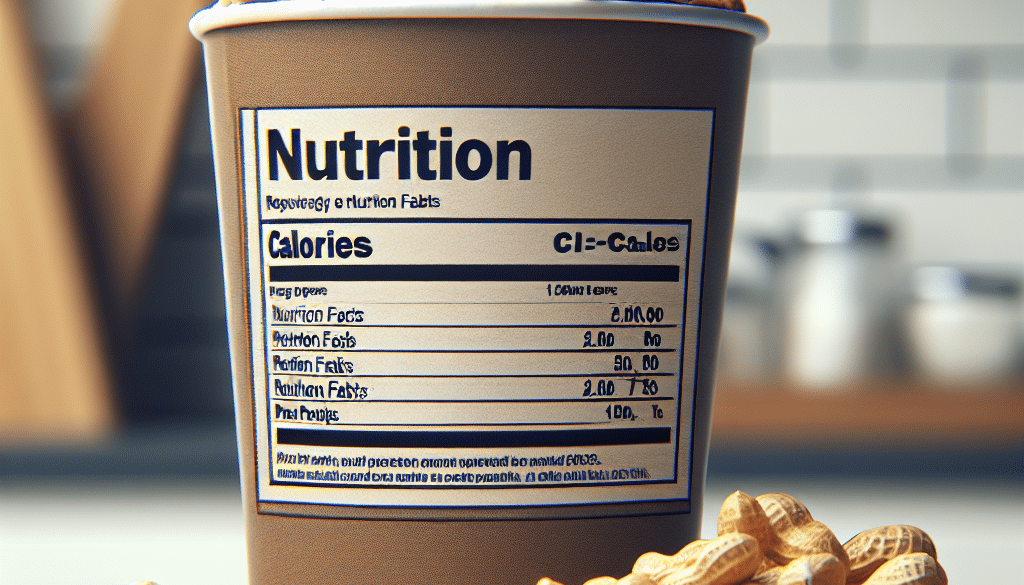How Many Calories Are in a Cup of Peanuts? Nutritional Insight
-
Table of Contents
- Caloric Content and Nutritional Insight of Peanuts: A Comprehensive Guide
- Caloric Value of a Cup of Peanuts
- Nutritional Profile of Peanuts
- Health Benefits of Peanuts
- Considerations for Peanut Consumption
- Integrating Peanuts into a Balanced Diet
- Conclusion: The Nutritional Takeaway
- Discover ETprotein’s High-Quality Protein Products
Caloric Content and Nutritional Insight of Peanuts: A Comprehensive Guide

Peanuts, a popular snack enjoyed by millions worldwide, are not only delicious but also packed with nutrients. However, when it comes to calorie counting and maintaining a balanced diet, understanding the nutritional content of what we consume is crucial. In this article, we delve into the caloric content of a cup of peanuts and provide a broader nutritional perspective.
Caloric Value of a Cup of Peanuts
Peanuts are energy-dense foods, meaning they contain a significant amount of calories in a small volume. A standard cup of dry-roasted, salted peanuts, which is approximately 146 grams, contains around 854 calories. It’s important to note that the calorie count can vary slightly depending on the preparation method and whether the peanuts are shelled or unshelled.
Nutritional Profile of Peanuts
Aside from their caloric content, peanuts offer a rich nutritional profile that includes proteins, healthy fats, vitamins, and minerals. Here’s a breakdown of the key nutrients found in a cup of peanuts:
- Protein: Peanuts are an excellent source of plant-based protein, with a cup providing about 38 grams.
- Fats: Although high in fats, with roughly 72 grams per cup, most of these are monounsaturated and polyunsaturated fats, which are beneficial for heart health.
- Fiber: Peanuts contain dietary fiber, around 12 grams per cup, which aids in digestion and promotes satiety.
- Vitamins and Minerals: Peanuts are rich in B vitamins, vitamin E, magnesium, phosphorus, potassium, and zinc, contributing to various bodily functions.
Health Benefits of Peanuts
Despite their high caloric content, peanuts have several health benefits when consumed in moderation:
- Heart Health: The monounsaturated and polyunsaturated fats in peanuts can help lower bad cholesterol levels and reduce the risk of heart disease.
- Weight Management: The protein and fiber in peanuts can help keep you full, potentially aiding in weight management efforts.
- Blood Sugar Control: Peanuts have a low glycemic index, making them a good snack option for maintaining stable blood sugar levels.
- Antioxidant Properties: Peanuts contain antioxidants like resveratrol and vitamin E, which can help combat oxidative stress in the body.
Considerations for Peanut Consumption
While peanuts are nutritious, there are some considerations to keep in mind:
- Allergies: Peanut allergies are common and can be severe. Those with allergies should avoid peanuts altogether.
- Caloric Density: Due to their high calorie count, portion control is essential, especially for individuals watching their weight.
- Aflatoxins: Peanuts can sometimes contain aflatoxins, harmful compounds produced by mold. Purchasing peanuts from reputable sources and storing them properly can minimize this risk.
Integrating Peanuts into a Balanced Diet
Integrating peanuts into a balanced diet can be done in various ways:
- As a Snack: A small handful of peanuts can be a satisfying snack between meals.
- In Meals: Peanuts can be added to salads, stir-fries, and other dishes for added texture and nutrition.
- Peanut Butter: Peanut butter can be a versatile spread for sandwiches or a dip for fruits and vegetables.
Conclusion: The Nutritional Takeaway
In conclusion, a cup of peanuts contains approximately 854 calories, along with a robust nutritional profile that includes protein, healthy fats, fiber, and essential vitamins and minerals. While they offer numerous health benefits, it’s important to consume peanuts in moderation due to their high caloric density. By incorporating peanuts into a balanced diet with mindful portion sizes, you can enjoy their taste and nutritional advantages without overindulging.
Discover ETprotein’s High-Quality Protein Products
If you’re looking for additional sources of protein to complement your diet, consider exploring ETprotein’s range of organic bulk vegan protein and plant proteins. Their products, including organic rice protein, pea protein, and peanut protein, are non-GMO, allergen-free, and have a neutral taste, making them an excellent addition to any health-conscious individual’s nutritional regimen.
About ETprotein:
ETprotein, a reputable protein Chinese factory manufacturer and supplier, is renowned for producing, stocking, exporting, and delivering the highest quality organic bulk vegan protein and plant proteins. They include Organic rice protein, clear rice protein, pea protein, clear pea protein, pumpkin seed protein, sunflower seed protein, mung bean protein, peanut protein etc. Their offerings, characterized by a neutral taste, non-GMO, allergen-free attributes, cater to a diverse range of industries. They serve nutraceutical, pharmaceutical, cosmeceutical, veterinary, as well as food and beverage finished product distributors, traders, and manufacturers across Europe, USA, Canada, Australia, Thailand, Japan, Korea, Brazil, and Chile, among others.
ETprotein specialization includes exporting and delivering tailor-made protein powder and finished nutritional supplements. Their extensive product range covers sectors like Food and Beverage, Sports Nutrition, Weight Management, Dietary Supplements, Health and Wellness Products, and Infant Formula, ensuring comprehensive solutions to meet all your protein needs.
As a trusted company by leading global food and beverage brands and Fortune 500 companies, ETprotein reinforces China’s reputation in the global arena. For more information or to sample their products, please contact them and email sales(at)ETprotein.com today.












